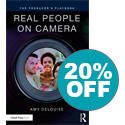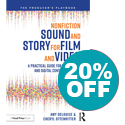Interviewing for Great Results
 Perhaps you have to interview your boss for a video clip on your website. Maybe you are hosting a podcast. Maybe you have to interview a job candidate. Whatever the reason, interviewing is an art form and not just a list of questions. Here are a few tips to creating a better outcome for both participants that I’ve developed over my 20+ years as a successful interviewer. These tips apply primarily, by the way, to the friendly interview and not the “gotcha” news interview.
Perhaps you have to interview your boss for a video clip on your website. Maybe you are hosting a podcast. Maybe you have to interview a job candidate. Whatever the reason, interviewing is an art form and not just a list of questions. Here are a few tips to creating a better outcome for both participants that I’ve developed over my 20+ years as a successful interviewer. These tips apply primarily, by the way, to the friendly interview and not the “gotcha” news interview.
- Do Your Homework. Just like an attorney doesn’t ask a question at trial to which s/he doesn’t already know the answer, you should have a good sense before the interview of what the content will be. Spend time learning the narrative of the person, conducting a pre-interview by phone if at all possible, and be well versed in the important content points you want to clarify.
- Make Eye Contact. If you do your homework, then you shouldn’t be referring to notes too often, if at all. (It’s a point of pride for me not to do this when I do video interviews.) Breaking eye contact breaks the personal connection between you and the interviewee, which is essential to keeping them comfortable and focused. Even if you, the interviewer, are not seen, the interview will be significantly more successful if you maintain eye contact throughout.
- Understand Your Interviewee’s Learning Style. There is significant research on people’s learning styles, which broadly fall into three categories—visual, kinesthetic and auditory. When you can identify which learning style best fits your interviewee, your questions can be better tailored to generate a good response from them. This all comes from the science of Neurolinguistic Programming, and I’ll let you do the internet surfing for more details. But basically you can develop several quick questions at the start of your interview which will help clue you in as to the learning style of your subject. From this you can craft better questions. “Describe what a typical day at your factory looks like” is not a great question for an auditory learner, for example. So, if I’ve got a visual learner, I might say “what does success look like to you at this company?” If she’s a kinesthetic learner, I might phrase it this way “How did you actually build the company for success—give me the steps?” For an auditory learner, “What kinds of feedback do you hear from customers that tells you you’ve hit on a successful formula here at Company ABC?”
- Plan the Arc of the Interview. Every interview has a beginning, middle and end much like a story. I never ask my most critical question first, but rather build a story line to the entire experience, that both my subject and I move through together. If you have to edit video, this is the most successful way to create editable content that won’t eat up valuable editing time.
- Know How to Get A Better Answer. The worst thing you can say to an interview subject is “can you repeat that?” because it generally makes people become self-conscious and/or entirely forget what they just said. If you instead use body language to indicate you couldn’t hear the answer properly 9even if you did), or a simple “Sorry…?” people almost always repeat their answer and improve upon it.
For more interview techniques and hands-on practice sessions, contact me for one of my workshops. I bring these into organizations and also give them at major conferences and events across the country.





Leave a Reply
Want to join the discussion?Feel free to contribute!